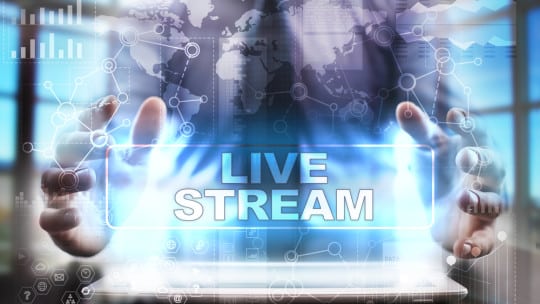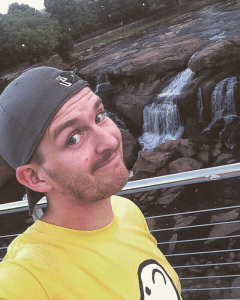
As the first person to live stream from all 50 U.S. states, Chris Strub has a great feel for what works and what falls flat when it comes to real-time video.
Strub accomplished that claim-to-fame during a 100-day self-funded volunteerism tour in 2015, where he leveraged the power of live streaming to help 50 different nonprofit youth organizations, one in each state, raise awareness of their cause.
These days, Strub is working on a live video campaign for health insurance company Humana to promote awareness of its regional Guidance Centers, which offer wellness programs and activities to a 55 and older audience. The resulting Facebook Live series has been successful in targeting that demographic by featuring a fitness class, an arts & crafts class and a cooking class with chef Nino Thibodaux, who spent an hour demonstrating some of his favorite recipes and interacting with the audience. Strub will share some of the lessons learned along the way at The Social Shake-Up conference May 22-24, 2017, in Atlanta.
PR News recently sat down with Strub to get his thoughts on live streaming best practices, where companies go wrong in their approach and how the industry will evolve in 2017.
PR News: What are the biggest mistakes companies make when they approach live streaming? What’s the biggest misconception?

Chris Strub: I think companies need to recognize and appreciate the distinction between video and live video—often, companies appear to get those confused. There are some very exciting and important elements to a live production that can easily be lost if you have a heavy background in traditional video production.
It’s so critical to take into consideration the interactivity element of the live broadcast and respect and appreciate those who are taking the time to join the broadcast live in the moment. Companies able to do that successfully are the ones really starting to succeed in the space and those that ignore the live audience are really dropping the ball. Too often, companies view live video as a one-way street.
Also, I think a lot of companies put themselves and their content on a pedestal and are so concerned about their image that they fear the interactivity and the live engagement, and that’s the opposite of what any live-video strategy should be. Live video is humbling, it’s a participatory experience—if you’re not capturing the spirit and enthusiasm of your audience live in the moment, you’re missing out.
PR News: What advice do you have for companies just starting out with live streaming?
Strub: Don’t be shy in getting started; just press that button and be yourself and don’t overthink it. Also, like Gary Vaynerchuk says: Document, don’t create. The best live streams are the ones not designed to put on a show; the best bring you behind the scenes and provide you this authentic look at what your company and business is all about—providing access to individuals who might not ordinarily be accessible, or providing information your audience wants to know more about.
Every piece of content you create should be a learning experience for your brand. The back-and-forth in your live streaming comments can really help you identify what’s important; your audience will help you determine what’s valuable.
And I think it’s important, before you ever press a button, to try and connect with just one person. It all starts with that first person watching you in the moment.
But there is no one specific prescription for a company. You have to look at every social media strategy by starting with what success looks like, what your goals are. Success for a vast majority of companies is not measured in the number of views or comments or likes. For nonprofits, it’s measured in donations, or awareness in community, for instance. So, every live video strategy needs to trace up to what the live goals are as an organization.
Broadly speaking, I suggest that a lot of organizations start with Facebook Live because for most organizations, the bulk of their audience will be on Facebook.
Looking for a deep dive into all things social? Check out the full program and speaker roster for The Social Shake-Up, which will be held May 22-24, 2017, in Atlanta. Brand communicators from Coca-Cola, Dunkin' Donuts, the Atlanta Hawks, Arby's and many more will speak on a breadth of topics from content marketing to measurement to Snapchat strategy.
How do you see the live streaming industry evolving in 2017?
Strub: In the vein of interactivity and engagement, my big hope for the live streaming industry is for there to be more collaborative video opportunities. Fostering interactive conversation from a desktop and mobile perspective is the next big challenge for Facebook and Periscope and YouTube to address—there are infinite more opportunities when the big-time players shift their mindset from one to several to many.
People want to talk to one another, and people want to see other people talking to each other, like you’d see on CNN or ESPN with conversations between anchors and guests. If people wanted to just watch somebody speaking to them, they’d watch a TED talks video. The excitement of the live industry is about engaging and conversing. So, the big push is to bring multiple people on camera.
I also see production value as being a big part of the direction that live streaming will move in 2017 because the audience does want to watch high-quality video with sharp sound and multiple camera angles.
Follow Chris Strub:@ChrisStrub
Follow Jerry Ascierto:@Jascierto
